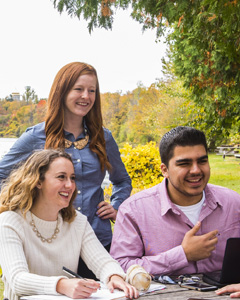 |
 |
 |
MA Economics program |
Ph.D. Economics program |
Post-Bac Diploma in Economics |
Thank you for your interest in the graduate programs in Economics!![]()
Deadline for application |
Date |
Application Information |
Fall Admission |
February 1st | Click Here |
Winter Admission |
|
Click Here |
Questions? Please see the contact information per program below:
Program |
Contact |
| Graduate Administrator | |
| Ph.D Program Inquiries | Professor Minjoon Lee, Ph.D. program supervisor |
| MA Program Inquiries | Professor Maya Papineau, MA program supervisor |
| Learn more about our program and life at Carleton using your CustomViewbook | |
Frequently Asked Questions:
- I am an international applicant. Can you review my documents before I apply?
-
The admissions committee does not review any qualifications or transcripts without the receipt of a formal application.
However, you can visit Carleton’s International Requirements website to help determine your eligibility.
- How much is the application fee?
$120.00 CAD
To determine the most current exchange rate, visit the Bank of Canada currency exchange rate calculator. The application fee must be paid in Canadian dollars.
The application fee is paid directly to Carleton University by Visa, MasterCard or INTERAC Online at the end of the application process.
Once your fee payment has been processed, you will receive an email within 1 – 3 business days with further instructions on how to complete your application package via Carleton Central.
- Can you please consider waiving my application fee?
-
The application fees are determined by the central university administration and unfortunately, they do not grant fee waivers.
- How and when do I apply for a study permit from outside Canada?
-
International students seeking study permit and immigration advice are encouraged to connect with authorized advisors at Carleton’s International Student Services Office (ISSO).
More specifically, ISSO’s Immigration Information and Support webpage provides information about international student status in Canada and resources for making applications to Immigration,
Refugees, and Citizenship Canada (IRCC).
For additional support, please contact the ISSO directly at isso@carleton.caApplicants recommend for admission will be provided with the following electronic documents on Carleton Central:
- an Offer of Admission,
- a Statement of Standing on Admission,
- and a Letter for International Students.
The documents above are to be submitted when applying for a study permit.
- What are the minimum requirements for admission to the M.A. program?
-
The minimum requirement for admission into the M.A. program is an undergraduate honours degree in economics with a B+ (77-79%) average, or the Carleton University minimum grade point average (GPA) of 9.00 out of a maximum of 12.00.
The overall average or GPA is calculated using the applicant’s last 20 courses completed, based on most courses being worth 0.5 credits. Credits completed outside a degree will also be counted. The last 20 courses are identified simply by counting back in chronological order. Find out more about Carleton’s Grade Point Scale.A grade of B+ (77-79%) or higher is also required in each area of advanced coursework in macroeconomics (ECON 4021), microeconomics (ECON 4020), and econometrics (ECON 4706).
The course outlines (syllabi) for the advanced economics courses listed above offered at Carleton can be found here.If any of the advanced coursework in economics has not been completed or does not meet the minimum B+ (77-79%) grade requirement, then an extended master’s may be offered to an applicant who is otherwise meeting all the other admission criteria. An extended master’s program is simply the regular master’s program with up to five additional course requirements and typically takes four terms of full-time study to complete.
Applicants with undergraduate degrees in finance, accounting, law, engineering, physics, or certain other disciplines, as well as students with undergraduate economics degrees that do not follow the standard North American pattern, with an overall average of B+ (77-79%) or higher using the applicant’s last 20 courses completed, may be admitted to the Post-Bac Diploma in Economics provided they have completed intermediate coursework in microeconomics, macroeconomics, econometrics, statistics, calculus, and linear algebra. Students who maintain an average of B+ or higher during their Post-Bac Diploma studies are given strong consideration for admission to the M.A. in Economics.
Applicants who are not sure for which program they are best qualified, are advised to apply for the master’s program.
- My first degree is in economics. Why do I have to get a Post-Baccalaureate Diploma before starting your M.A. program?
-
Many international students are admitted into the PBD program. Canadian programs place a greater emphasis on microeconomic theory, macroeconomic theory, mathematical economics, and econometrics than do most programs outside Canada. If you believe the courses you took as an undergraduate really are equivalent to Canadian undergraduate courses, the best thing to do is to provide the M.A. Supervisor with the course syllabi. This information can be used to evaluate the courses.
- What are the deadlines to apply?
-
For Fall intake to the M.A. and Ph.D. programs, all documents should be received by February 1st.
In order to be considered for first round financial assistance, your complete application including any supplementary documents (transcripts and letters of reference etc.) should be received by this deadline.International applicants who require a study permit will not be considered for Fall admission unless their applications are complete by May 1st.
For Winter intake to the master’s programs, all official documents from domestic applicants recommended for admission, should be received by December 15th, and all documents from international applicants recommended for admission, no later than August 1st.
- Do I need GREs to apply?
-
You can apply for the M.A. and Ph.D. programs without submitting Graduate Record Examination (GRE) scores. However, it is recommended that applicants with degrees from universities outside Canada (especially from very different university systems) take the GRE® to enable a more accurate assessment of their backgrounds.
- Do I need to find a supervisor before applying?
-
The master’s program is a course-based program, therefore applicants do not need to find a supervisor.
Once a student has completed their core master’s course requirements with a minimum A- in each, they may then submit an application to complete the thesis option (ECON 5909) or directed research course (ECON 5906).If an applicant needs to list a supervisor for use in a scholarship application, they may list the MA Program Supervisor.
- Does it really cost $29,000-$35,000 to study in Canada for a year?
-
In order to obtain a visa, Citizenship and Immigration Canada requires that you prove that you have enough money to support yourself while studying in Canada. Carleton University estimates the costs of living and schooling at between $32,000 and $40,000 (CAD) per year (this estimate may vary depending on your program of study)—see the information at graduate.carleton.ca/international/cost-and-fees.
- What are my chances of receiving financial assistance?
-
M.A. program: Your chances of receiving financial assistance are greatest if your undergraduate degree is from a Canadian university and your undergraduate average is A- or higher.
Ph.D. program: Each year, a small number of outstanding applicants are awarded financial assistance. Generally, we only admit students to our program to whom we can award financial assistance.
- If I receive financial assistance, how much will I get?
-
Students may be offered: a teaching assistantship valued at $12,000; a graduate scholarship of between $2,000 and $10,000 for (domestic) M.A. students or between $5,000 and $15,000 for (domestic and international) Ph.D. students; and, if eligible, an entrance scholarship of $2,000 for domestic M.A. students or $3,000 for domestic Ph.D. students.
When planning to pay for your university education in Canada, it’s important to explore all of the funding options that are available to you from all sources. Please note that funding from Carleton (including teaching assistantships, research assistantships and scholarships) is limited to only a few outstanding international applicants. For more information on financial assistance for international students click here.
- Where can I find information about scholarships for international students?
-
Information for international students about “Scholarships and Money Matters” can be found here: https://carleton.ca/isso/services-for-current-students/money-matters/
- How long is the M.A. program?
-
Full-time master’s students are expected to complete their 4.0-credit course requirements within two terms.
Part-time master’s students will take a minimum of four terms but have a maximum of 6 years to complete the program as set out in Section 13 of the General Regulations of the Graduate Calendar.Please note, students who apply to study part-time are not eligible for funding, awards or scholarships.
Full- or part-time status is established at the time of admission to a program.
When you receive an admission offer from Carleton, please read the pink “Statement of Standing on Admission” form very carefully. This form tells you exactly what your program requirements are.
- Where can I find tuition fee information?
-
Tuition fee information can be found at www.carleton.ca/studentaccounts/tuition-fees.
When using the Tutition Fee Estimator, to calculate the fees for full-time study in our master’s program, enter the following information:Term: Most recent fall term available :Fall [Insert Year of Admission] (September-December)
Level: Graduate
Year of Study: First Year
Full/Part Time: Full Time
Number of Courses: 1 (if your status is Full Time the number of courses does not matter)
Residency: Select Ontario, Other Canadian, or International
Program: Select “All other Masters Programs”
Include UPass Fee: Yes
Include UHIP Fee: Select Yes if you selected “International” for your Residency.
Then click ‘Estimate My Fees’.Use the total provided and multiply that by the number of terms you expect to take to complete your program
Full-Time study:
x 2 if you plan to complete 4.0 credits over 2 terms.
x 3 if you plan to complete 4.0-6.0 credits over 3 terms.
Part-Time study:
typically x 4 to complete 2 courses per term over 4 terms.
- Where can I find out about housing accommodations?
-
Visit the Department of Housing and Conference Services at www.carleton.ca/housing or the International Student Services Office (ISSO) at www.carleton.ca/isso.
- How do I register for my courses?
-
Registration information and instructions can be found at www.carleton.ca/registrar/registration.
- I am interested in the M.A. with Concentration Financial Economics but I am unable to make this selection in the application.
-
Applicants wishing to pursue the M.A. Economics, Concentration in Financial Economics do not need to identify this on their application but will select the courses required to complete the degree requirements outlined in the Graduate Calendar. Upon completion of the concentration requirements, then the designation of the Financial Concentration will be added officially to your diploma.
- I am interested in studying accounting. Can I take accounting in the Carleton Economics M.A. program?
-
If you are interested in studying accounting, marketing, or management at Carleton, you should be applying to the Sprott School of Business at www.carleton.ca/sprott.
- How can I appeal an admission decision?
-
There is no formal process for appealing admission decisions. You can discuss admission decisions with the program supervisor.
- Why aren’t you replying to my e-mail?
-
Carleton University blocks all e-mail that looks like “spam.” If you are not getting a reply, it may be that your e-mail has been blocked by the spam filter. To increase the chances of your e-mail getting through, write your message as if you were writing a letter. Start off with “Dear Professor Chris Worswick” or “Dear Ms. Lortie,” use lower case letters, and run a spell-check. Avoid user names and subject titles with numbers in them. If your e-mail does not get through, try sending it at a different time of day or with a different subject heading.
- I am being required to upload a Language Proficiency test score, but I already meet your requirements. What should I do?
-
If you have studied within the last three years (full-time, non-ESL) in a university in Canada, the United States, the United Kingdom or any other country in which the primary language is English and where the language of instruction in the relevant educational institution was exclusively English, you need to complete the Confirmation of Language Proficiency form. You must then save and upload it with your required documents in Carleton Central as Document Type: Language Proficiency.
- My first language is not English. What are the minimum language proficiency requirements for your program?
-
All applicants whose first language is not English must satisfy this requirement in one of the following ways:
(i) by presenting a CAEL overall band score of 70 or higher; or
(ii) by presenting a TOEFL iBT total score of 100 or higher with a score of 24 or higher on each of the four (Listening, Reading, Writing, and Speaking) sections; or
(iii) by presenting an IELTS overall band score of 7.0 or higher with a score of 6.5 or higher on each of the four (Listening, Reading, Writing, and Speaking) parts
(iv) A Duolingo (DET) overall score of 125; Literacy- 130; Conversation- 115; Comprehension- 135; and Production- 110; or
(v) by having completed ESLA 1900 or ESLA 1905 at Carleton University with a final grade of B- or higher
Note that applications for admission will be considered incomplete until the English language proficiency requirement has been met.
- I have not yet taken my language test but I know that I will have to. How do I declare this on my application?
If you do not currently have language test scores, but intend to write a test at a later date, you should notify the academic unit to which you are applying.
- I am an international applicant and have been offered admission to Carleton University, but need a specific letter from Carleton for Immigration, Refugees and Citizenship Canada for my study permit application.
Where can I get this letter? -
You can access this letter in Carleton Central which is indicated as “Letter for International Students”. It contains the information required by Immigration, Refugees and Citizenship Canada (IRCC) for your study permit application. This should be submitted along with your Offer of Admission and Statement of Standing on Admission.
- I can’t get my visa on time. What should I do?
-
Your offer of admission is good for one term only. Read the pink “Statement of Standing on Admission” form carefully. If it says “Fall 2024,” you must start in September 2024.
It takes some time to get used to Canada, find a place to live, and so on. It is often better to delay until the following academic year than to arrive late.
Share: Twitter, Facebook
Short URL:
https://carleton.ca/economics/?p=29
